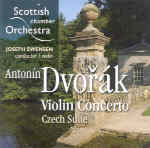Joseph Swensen is an extremely intelligent performer, and he’s made some outstanding recordings for LINN both as violinist and conductor, most notably his Brahms and Prokofiev recitals. This latest entry is certainly good, but not quite in that league. The Violin Concerto opens very well, with snappy rhythms and seductive phrasing from Swensen, and he continues with as poetic an account of the central Adagio as we could ask. As with Queyras’ recording of the Cello Concerto for Harmonia Mundi, the presence of a crack chamber orchestra permits a welcome lightness of texture and emphasis on the beautiful woodwind writing. It’s worth remembering that orchestras in Dvorák’s day often were this size, and the resulting interplay between soloist and ensemble has great naturalness.
The finale, though, is a bit of a problem. I understand what Swensen is trying to do here–the careful observance of dynamics, the ethereal presentation of the main theme, and the gently dancing treatment of rhythm–but the result still sounds curiously flat. The music needs more rustic color and a touch more meat on its rhythmic bones, for instance at the duet between violin and solo timpani, with those earthy drones from the strings. This is all just a bit too genteel, the exciting coda notwithstanding. Still, it’s a legitimate and fully realized conception, and certainly not more of the same. Swensen deserves credit for personalizing the music in a way that’s different but never disrespectful, and he does get excellent results from the orchestra.
There are also some unusual touches in the Czech Suite, including an unusually swift opening Preludium–and in the gorgeous Romance, Swensen avails himself of Dvorák’s option to replace the English horn with a basset clarinet. I personally prefer the original for its greater timbral pungency and heightened sense of nostalgia, but you won’t hear this version anywhere else. It makes an interesting change of pace. Both the Nocturne and the Waltz Op. 54 No. 1 come off splendidly, and as usual LINN’s sonics are superb whether in stereo or multi-channel formats. In sum, there’s a great deal here to enjoy, and I applaud Swensen’s independence and well-thought-out approach; but in the concerto he likely will not weaken your allegiance to Suk/Ancerl, the stunning recent Sporcl/Belohlávek (both on Supraphon), or your own personal favorite interpretation.
































